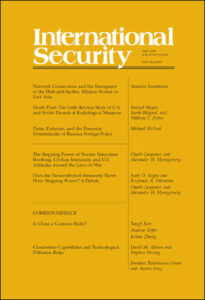October 22, 2020
 Since September 11, 2001, most expert commentary on radiological weapons has focused on nonstate actors, to the neglect of state-level programs. In fact, numerous countries in the past have expressed interest in radiological weapons; a number have actively pursued them; and three tested them on multiple occasions before ultimately deciding not to deploy the weapons. Why is so little known about these false starts, especially outside the United States? Are such weapons more difficult to manufacture than depicted by science-fiction authors and military pundits? Are radiological weapons a thing of the past, or do they remain an attractive option for some countries?
Since September 11, 2001, most expert commentary on radiological weapons has focused on nonstate actors, to the neglect of state-level programs. In fact, numerous countries in the past have expressed interest in radiological weapons; a number have actively pursued them; and three tested them on multiple occasions before ultimately deciding not to deploy the weapons. Why is so little known about these false starts, especially outside the United States? Are such weapons more difficult to manufacture than depicted by science-fiction authors and military pundits? Are radiological weapons a thing of the past, or do they remain an attractive option for some countries?
A study published in the journal International Security (Vol. 45, No. 2, Fall 2020) coauthored by Samuel Meyer, Sarah Bidgood, and William C. Potter offers a comparative analysis of these underexplored programs in the United States and Soviet Union and identifies the drivers behind their rise and demise. The findings also illuminate the factors likely to affect the pursuit of radiological weapons by other states in the future. The article proposes steps that might be undertaken to reduce the possibility of their production, deployment and use.
About the Authors
Samuel Meyer supports the Nuclear Threat Initiative (NTI) grant at the James Martin Center for Nonproliferation Studies at the Middlebury Institute of International Studies at Monterey.
Sam Meyer is responsible for upkeep and maintenance of the Nuclear Threat Initiative’s vast online library of informational profiles of countries, treaties, international organizations, and facilities relevant to WMD and nonproliferation issues. He also prepares interactive tutorials on nonproliferation issues, and maintains databases related to civilian HEU stockpiles, submarine proliferation, and national disarmament efforts. He is the coauthor of the 2016 CNS Global Incidents and Trafficking Report, and works closely with graduate students to hone their research and writing skills. Sam earned his MA in Nonproliferation and Terrorism Studies from the Middlebury Institute of International Studies in Monterey (MIIS) in 2016. A US Army veteran, Sam studied Arabic at the Defense Language Institute. Sam is a two-time winner of the TV game show, “Jeopardy!”
Sarah Bidgood is the director of the Eurasia Nonproliferation Program at the James Martin Center for Nonproliferation Studies in Monterey, California. Her research focuses on US-Soviet and US-Russia nonproliferation cooperation, as well as the international nonproliferation regime more broadly. She is the co-editor (with William C. Potter) of the book Once and Future Partners: The United States, Russia, and Nuclear Non-Proliferation, which was published by the International Institute for Strategic Studies in 2018. Her areas of research include US–Soviet and US–Russia nonproliferation cooperation; US-Russia arms control; the Nonproliferation Treaty review process; and the Comprehensive Nuclear-Test-Ban Treaty. Sarah earned her BA in Russian from Wellesley College. She also holds an MA in Russian, East European, and Eurasian Studies from the University of North Carolina at Chapel Hill and an MA in Nonproliferation and Terrorism Studies from the MIIS.
William C. Potter is the founding director of the James Martin Center for Nonproliferation Studies at MIIS. He is the Sam Nunn and Richard Lugar professor of nonproliferation studies and a member of the Council on Foreign Relations. He has served as a consultant to the Arms Control and Disarmament Agency, Lawrence Livermore National Laboratory, the RAND Corporation, and the Jet Propulsion Laboratory. He has been a member of several committees of the National Academy of Sciences, including its Nonproliferation Panel. He served for five years on the UN Secretary-General’s Advisory Board on Disarmament Matters and the Board of Trustees of the UN Institute for Disarmament Research. He has participated as a delegate at every NPT Review Conference and Preparatory Committee meeting since 1995. His areas of research include nuclear terrorism; forecasting proliferation developments; US–Russia relations; the NPT review process; and the nuclear policies of the Non-Aligned Movement. His authored books include Nuclear Politics and the Non-Aligned Movement (2012); The Four Faces of Nuclear Terrorism (2005); Tactical Nuclear Weapons: Options for Control (2000); and Nuclear Profiles of the Soviet Successor States (1993). He has also co-edited numerous volumes, including the recent Preventing Black-Market Trade in Nuclear Technology (2018).
See Also
- Death Dust: Why the World Should Still Worry about Radiological Weapons – A Geneva Security Debate
Hanna Notte and William Potter discuss lessons from prior radiological weapons programs and past efforts to prohibit these weapons. - Death Dust: The Rise, Decline, and Future of Radiological Weapons Programs – CISAC Stanford
Death Dust explores the largely unknown history of the rise and demise of RW—sometimes portrayed as a “poor man’s nuclear weapon”—through a series of comparative case studies across the United States, the Soviet Union, the United Kingdom, Egypt, and Iraq. - Death Dust: The Rise, Decline and Future of Radiological Weapons Programs
This seminar focuses on the findings of the recently published book “Death Dust: The Rise, Decline and Future of Radiological Weapons Programs.”
